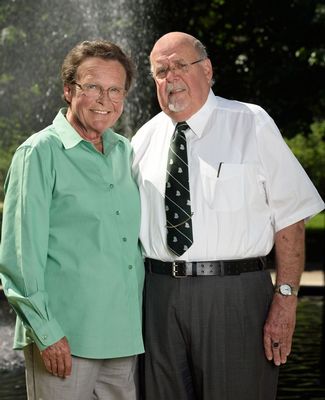Tiny Animals, Big Impact
"These little animals that people take for granted break down organic matter, and are so important in the ecosystem. Without this money, this collection could deteriorate in no time at all."

Tiny Animals, Big Impact
"These little animals that people take for granted break down organic matter, and are so important in the ecosystem. Without this money, this collection could deteriorate in no time at all."
October 30, 2015For a combined 105 years, Richard Snider, a professor of integrative biology, and Renate Snider, an assistant professor in the College of Natural Science, have been at MSU studying “little animals.”
He came to Michigan State from Plymouth, Mich., as an undergraduate student in fall 1957. She arrived at MSU from Vienna, Austria, in December 1968 on a Fulbright travel grant.
“We met just around the corner,” Richard said, pointing down the hall from where their current offices are located in the basement of the Natural Science Building. “I helped her buy a car and taught her how to drive.” They married in August 1969.
Richard’s first job on campus was in the entomology museum, pinning insects and spreading butterflies. She first worked as a lab technician, “rearing little animals,” specifically, Collembola (or springtails). He earned three degrees in entomology from MSU, including his Ph.D. in 1972. She continued to work as a research technician in the entomology and zoology departments until completing her Ph.D. in zoology in 1980.
The couple had the opportunity to team up to do research on the ELF communications systems ecological monitoring project in Michigan’s Upper Peninsula that ran from 1982 until 1994.
Although she enjoyed her time as a researcher, Renate now devotes all her time to her true passion—teaching. She has taught a variety of courses over the years.
“This is what I love doing,” she said.
In 2000, she developed and began teaching NSC 840 – Writing in the Sciences, a graduate course for students in natural science, engineering, and agriculture and natural resources.
“This is not a grammar course. I teach them now to think,” Renate pointed out.
Students are able to enroll in the class up to three times.
“I may get a student writing a research proposal at the beginning of their program, and then two years later, he or she will enroll again when writing a dissertation,” she said. “These students say to me, ‘Dr. Snider, I’m coming back for more punishment!’ Or, ‘I like your tough love; I’ll be back next semester!’”
She also teaches the capstone course for human biology majors.
In the early 1990s, Richard developed the curriculum in zoo and aquarium science and initiated and helped build the department’s powerful internship program.
“This department puts more interns out there than most departments in the College of Natural Science,” Richard said. “We now send students all over the world—to Australia, Spain, England, Germany, Mexico. And it’s paying off. Our students get jobs.”
Richard continues to teach the introductory course in zoo and aquarium science. He also curates Collembola (and other apterygotes), isopods, spiders and related arachnids in the A.J. Cook Arthropod Research Collection.
“These little animals that people take for granted break down organic matter, and are so important in the ecosystem,” Richard said.
To ensure that their work and the work of other researchers in this field will endure long after they are gone, the Sniders have made a $1 million planned gift to the Drs. Richard J. and Renate M. Snider Endowment for the A.J. Cook Arthropod Research Collection.
“A great university always has great museums,” Richard said. “This collection is an important resource for Michigan State University.”
“Without this money, it could deteriorate in no time at all,” Renate added.
The collection at MSU contains specimens from the Northwest Territory, as well as specimens donated by the long-defunct Detroit Naturalist Society. The museum also houses the Snider-Christiansen Collembola Collection.
When asked about the importance of faculty giving, Richard said: “The secret to building a good source of funding for the departments is getting the faculty to get behind it. And that’s what we should be asking here: ‘Are faculty behind this?’”
For more information on making a gift to the College of Natural Science, contact Associate Director of Development Karen Wenk at wenk@msu.edu or call (517) 353-5962.
Author: Laura Seeley




